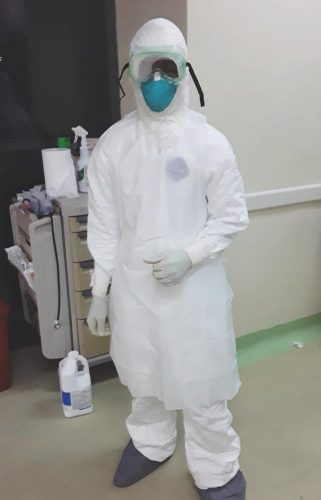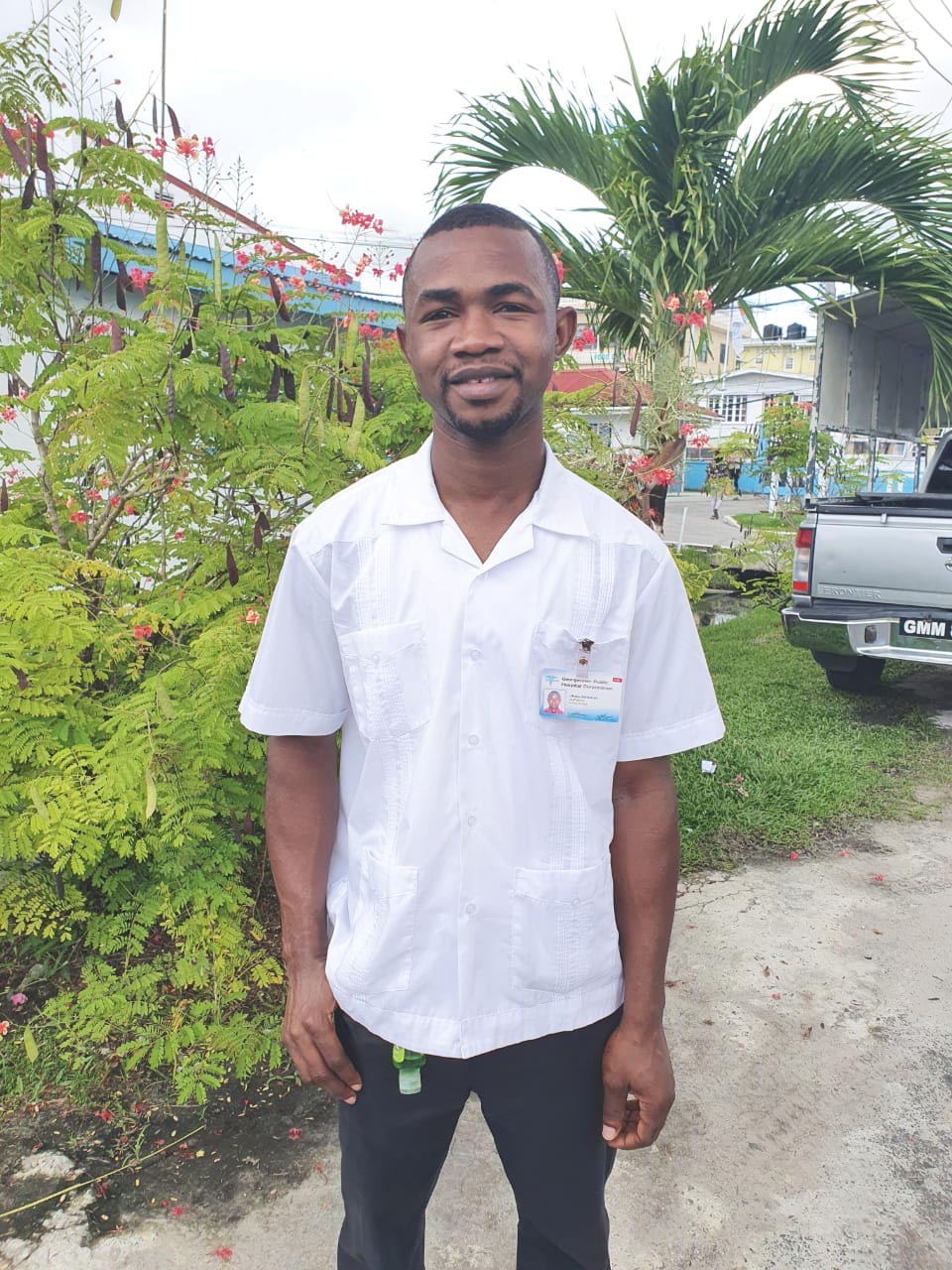Nigerian born nurse Ishaku Zechariah is one of the many health workers who are on the frontlines of the battle against COVID-19 in Guyana.
He believes he is fulfilling a higher calling.
Zechariah, who is a General Nurse, has been in the profession for about 13 years and worked in Nigeria before making his way to Guyana to study for his Bachelor’s Degree in Nursing. He has been working in Guyana since completing the programme.
During an interview, Zechariah revealed that he was among a number of other nurses and doctors who volunteered to work and give their time in the COVID-19 Intensive Care Unit which was set up at the Georgetown Public Hospital in late March following the spread of the novel coronavirus in Guyana.

The nurse though hesitant still volunteered after discussions with family members and even praying. “I was a little hesitant but I gave it some time, talked with my wife, prayed over it and I felt convinced God wanted me to be there,” Zechariah said. He noted that since January when the news came out about the coronavirus, he read about the way the virus was spreading in other countries and was convinced that it was only a matter of time for the virus to get to this part of the world.
Zechariah pointed out that there wasn’t much known about the virus from the inception as it was a new strain of the coronavirus family and all the information that was gathered in the earlier stages of the outbreak was only based on similar viruses and that contributed to the anxiety and fear of dealing with it.
Given that there wasn’t much known at the time, Zechariah stated that after he volunteered, there was an emergency meeting called where he and others were briefed and given some training on handling the outbreak on the frontline. “I also took my personal time to read about the disease because I wanted to know about what is coming, I wanted to know what I can do as an individual and as a nurse… I also took some online courses on ICU ventilation. I did a lot of reading and research personally,” he said.
There were also a number of other training sessions and workshops for frontline workers.
Challenges
Among some of the challenges Zechariah faced so far since the outbreak were the fear and anxiety of being separated from his family as those persons who are working in the ICU have to be isolated from their families as they are more at risk of contracting the virus since they are working in close proximity to infected patients.
This was even more complicated for Zechariah as his wife was pregnant and expected to deliver at any time. He worried about who would take care of his wife and look after her and the baby that they were expecting very soon at that time. “The issue of who will look after my wife, what if the baby comes now, who will look after her in the hospital, all those things put so much concern in my mind,” he said before adding that while praying over what to do, a scripture came to mind which pointed to the direction where he noted that God wanted him to be. That bible scripture was in the book of Esther, Chapter 4.
Zechariah explained that in that chapter of Esther, specifically verse 14, “The Jews were in trouble and she was a Jew and was the queen and Mordecai asked her if she would ask the king to spare them. She was hesitating to help the fellow Jews and Mordecai told her, if you refuse to help us this time, God is still faithful anyhow and God will save us.”
He further added that the scripture felt like a message for him and if God requires him to serve at this time, he will. The scripture from the New International Version (NIV) reads, “For if you remain silent at this time, relief and deliverance for the Jews will arise from another place, but you and your father’s family will perish. And who knows but that you have come to royal position for such a time as this.”
Apart from that, Zechariah noted that as a nurse, when duty calls he will go. “Nursing is my calling and that’s what I have to do. All I had to do was have some talks with my wife and make arrangements,” he said. While questioning himself on the possibilities of contracting the virus while working in the ICU, Zechariah noted that he had to internally resolve that conflict and was then clear on working on the frontline.
One of the major nightmares, Zechariah recalled, was having the first few critical patients that were intubated die. He noted that after that he wondered if more persons that were admitted to the ICU would die. He went on to say that that fear went away after they had the first patient that was successfully weaned off of ventilation and recovered. “That was a real morale booster for me. I thought if this can happen with one patient it can happen with others,” he said.
COVID care
Providing care for COVID-19 patients, Zechariah said, was more complicated than the typical nursing care. “When it comes to COVID care, you don’t only care for the patient you care for the patient and at the same time, care for yourself,” he explained. He went on to say that it comes with a lot of emotions and it is risky as the rate in which frontline workers can contract the virus is extremely high.
While noting that 80% of patients who contract the virus do not exhibit serious symptoms, Zechariah said that the most that is done for such persons is that they are put in isolation and efforts are made to cater for their emotional state while monitoring their physical condition and nutrition. “We cater for their emotional state because the diagnosis alone can be a huge emotional blow and they need psychological support,” he said.
Additionally, he noted that the nurses have undergone training sessions to be able to cater for the patients’ psychological needs and where they would not be able to cater for those patients, they are able to assist in facilitating psychologists communicating with them.
For the patients who may exhibit mild symptoms of the virus, they may need hospitalisation but not necessarily ICU care. He noted that basic care is meted out to those patients as medication is administered, their vitals are checked and tests are completed. He noted that psychological care is also important for these patients even as they are able to do almost everything for themselves. He said they also take on creating links between the patients and their family members, religious leaders or even friends.
Zechariah, however, cares for patients in the ICU, who require critical care as they have severe symptoms of the virus and may even need to be placed on ventilators, which means that a tube will be placed within the trachea of the patient and will do a large percent of the breathing work for those patients. He mentioned that those patients who have to be intubated are sedated and will not be able to do any of the basic functions for themselves. With that he said that nurses at that point have to do everything for those patients, including exercise their limbs, feed them and to ensure that they have the necessary medication.
Those patients requiring intubation, Zechariah explained, are those who are having shortness of breath and are labouring a lot to breathe but are still not receiving enough oxygen to sustain their bodily functions.
Pulse oximetry is used to monitor the patient, he said. “By the time you notice that their situation is below 90 it means they are getting critical, the body is not getting sufficient oxygen to keep the function going,” he further said. “Basically when they are in ICU and they are on ventilation, we do everything for them because at this point they can’t do anything for themselves,” he added.
There are also patients who do not necessarily need to go on ventilation while in ICU but may just be there as their conditions are getting worse and they need to be closely monitored.
Zechariah went on to say that while working in the facility has had its challenges, he still feels great to be able to be of service and to help in combatting the virus even as they would have seen just under 30 patients pass through the ICU since the opening of the facility at the hospital.
In addition to that, the frontline nurse stated that he is able to keep his own mental health in check while dealing with a global pandemic by keeping up the rapport with the other nurses that are on the team as they have lots of group sessions where they share ideas, express their feelings and update each other on issues that they are facing while working. He added that they had previous training sessions on self-care while managing patients. “We knew that the situation is traumatising, [and] we knew that the situation [requires] counselling, so once every week we have a meeting and brief each other on the situation, share information, our view and concerns among our peers,” he noted.
According to Zechariah, his greatest motivation is knowing that he stands with many other health care workers who are battling to save the world as global pandemic continues to spread. “Even if COVID goes away today, I have a story to share, I have an experience in [the] care of infectious patients,” he said while adding that his greatest reward is seeing patients recover and appreciating the work that he and other nurses put in to ensure that they are healthy.
He went on to encourage citizens to take the necessary precautions to protect themselves from contracting the virus as anyone can become infected.





